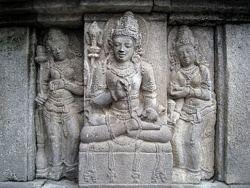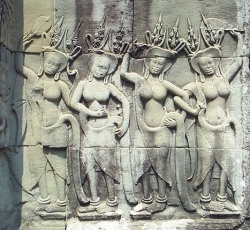Difference between revisions of "Devata"
| (2 intermediate revisions by the same user not shown) | |||
| Line 1: | Line 1: | ||
[[File:Devata_Apsaras.jpg|thumb|250px|]] | [[File:Devata_Apsaras.jpg|thumb|250px|]] | ||
| − | + | [[Deva]] is the [[Hindu]] term for [[deity]]; [[devatas]] ({{Wiki|Devanagari}}: [[देवता]], Khmer: [[tevoda]] (ទេវតា), Javanese, Balinese, Sundanese, Malay and {{Wiki|Indonesian}}: [[dewata]]; Cebuano/Tagalog: [[diwata]]), are a kind of smaller more focused [[devas]]. The term "[[devata]]" also means [[devas]] ([[deva]] in plural [[form]] or the [[gods]]). They are {{Wiki|male}} and {{Wiki|female}} [[devata]]. There are many kinds of [[devatas]]: [[vanadevatas]] ({{Wiki|forest}} [[spirits]], perhaps descendants of early nature-spirit cults), [[gramadevata]] ([[village gods]]), [[devata]] of [[river]] crossings, [[caves]], mountains, and so on. In [[Hinduism]], the [[devatas]] that guard the nine [[cardinal points]] are called [[Devata Lokapala]] ([[Guardians of the Directions]]) or in {{Wiki|ancient}} {{Wiki|Java}} called [[Dewata Nawa Sanga]] ([[Nine guardian gods]]). Every [[human]] [[activity]] has its [[devata]], its [[spiritual]] counterpart or aspect. | |
| − | Hindu [[devatas]] in the Konkan region are often divided into five categories:[1] | + | [[Hindu]] [[devatas]] in the Konkan region are often divided into five categories:[1] |
[[File:Devatas01.JPG|thumb|250px|]] | [[File:Devatas01.JPG|thumb|250px|]] | ||
| − | 1. Grama devatas - or village deities, for example, Hanuman, Kalika, Amba, Bhairava. | + | 1. [[Grama devatas]] - or village [[deities]], for example, {{Wiki|Hanuman}}, [[Kalika]], [[Amba]], {{Wiki|Bhairava}}. |
| − | 2. Sthana devatas - or local deities, for example, those in certain places of pilgrimage like Rama in Nasik, Vithoba in Pandharpur or Krishna at Dwarka. | + | 2. [[Sthana devatas]] - or [[local deities]], for example, those in certain places of [[pilgrimage]] like {{Wiki|Rama}} in {{Wiki|Nasik}}, [[Vithoba]] in Pandharpur or {{Wiki|Krishna}} at Dwarka. |
| − | 3. Kula devatas - or family deities, like Khanderai. | + | 3. [[Kula devatas]] - or family [[deities]], like [[Khanderai]]. |
| − | 4. Ishta devatas - or Chosen deities, | + | 4. [[Ishta devatas]] - or Chosen [[deities]], |
| − | 5. Wastu devatas or Gruha devatas - or a class of deities that preside over the house. | + | 5. [[Wastu devatas]] or [[Gruha devatas]] - or a class of [[deities]] that preside over the house. |
| − | Some of well known Hindu-Buddhist heavenly beings belong to the group of [[devatas]], such as [[apsara]] or [[vidhyadari]]; [[heavenly maiden]] that sent by Indra from svarga to seduces the [[meditating]] [[ascetics]], and her male counterparts; [[gandharvas]]; the [[heavenly musicians]]. [[Devatas]] often occurred in Hindu epics such as Ramayana and Mahabharata, and also some [[Buddhist]] holy scriptures. The island of Bali is nicknamed as Pulau Dewata (Indonesian: "islands of | + | Some of well known Hindu-Buddhist [[heavenly beings]] belong to the group of [[devatas]], such as [[apsara]] or [[vidhyadari]]; [[heavenly maiden]] that sent by [[Indra]] from [[svarga]] to seduces the [[meditating]] [[ascetics]], and her {{Wiki|male}} counterparts; [[gandharvas]]; the [[heavenly musicians]]. [[Devatas]] often occurred in [[Hindu]] epics such as {{Wiki|Ramayana}} and {{Wiki|Mahabharata}}, and also some [[Buddhist]] {{Wiki|holy}} [[scriptures]]. The island of Bali is nicknamed as [[Pulau Dewata]] ({{Wiki|Indonesian}}: "[[islands of devata]] or [[island of gods]]"), because of its vivid [[Hindu]] {{Wiki|culture}} and [[traditions]]. In Bali, there are many [[offerings]] dedicated to [[hyang]], the [[guardian spirits]] associated with [[devata]]. |
{{W}} | {{W}} | ||
| − | [[ Deva's]] | + | [[Deva's]] |
| + | {{SanskritTerminology}} | ||
| + | [[Category:Deva's]] | ||
Latest revision as of 06:11, 27 October 2013
Deva is the Hindu term for deity; devatas (Devanagari: देवता, Khmer: tevoda (ទេវតា), Javanese, Balinese, Sundanese, Malay and Indonesian: dewata; Cebuano/Tagalog: diwata), are a kind of smaller more focused devas. The term "devata" also means devas (deva in plural form or the gods). They are male and female devata. There are many kinds of devatas: vanadevatas (forest spirits, perhaps descendants of early nature-spirit cults), gramadevata (village gods), devata of river crossings, caves, mountains, and so on. In Hinduism, the devatas that guard the nine cardinal points are called Devata Lokapala (Guardians of the Directions) or in ancient Java called Dewata Nawa Sanga (Nine guardian gods). Every human activity has its devata, its spiritual counterpart or aspect.
Hindu devatas in the Konkan region are often divided into five categories:[1]
1. Grama devatas - or village deities, for example, Hanuman, Kalika, Amba, Bhairava.
2. Sthana devatas - or local deities, for example, those in certain places of pilgrimage like Rama in Nasik, Vithoba in Pandharpur or Krishna at Dwarka.
3. Kula devatas - or family deities, like Khanderai.
4. Ishta devatas - or Chosen deities,
5. Wastu devatas or Gruha devatas - or a class of deities that preside over the house.
Some of well known Hindu-Buddhist heavenly beings belong to the group of devatas, such as apsara or vidhyadari; heavenly maiden that sent by Indra from svarga to seduces the meditating ascetics, and her male counterparts; gandharvas; the heavenly musicians. Devatas often occurred in Hindu epics such as Ramayana and Mahabharata, and also some Buddhist holy scriptures. The island of Bali is nicknamed as Pulau Dewata (Indonesian: "islands of devata or island of gods"), because of its vivid Hindu culture and traditions. In Bali, there are many offerings dedicated to hyang, the guardian spirits associated with devata.

